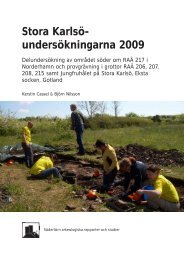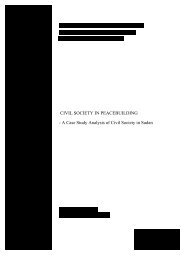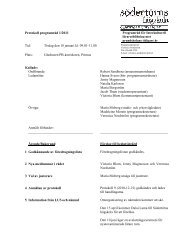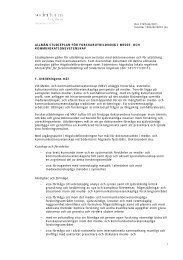Underlying Reasons for the Persistence of Female Genital Mutilation
Underlying Reasons for the Persistence of Female Genital Mutilation
Underlying Reasons for the Persistence of Female Genital Mutilation
Create successful ePaper yourself
Turn your PDF publications into a flip-book with our unique Google optimized e-Paper software.
It is through this organization I have been given <strong>the</strong> opportunity to visit villages where FGM<br />
used to be per<strong>for</strong>med.<br />
Gallapo Village<br />
In Gallapo village FGM used to be a part <strong>of</strong> <strong>the</strong> society and was strongly connected to <strong>the</strong><br />
tradition <strong>of</strong> FGM. Since <strong>the</strong> illegalisation <strong>of</strong> FGM and through education and help from AFNET,<br />
<strong>the</strong> practice is no longer exercised in Gallapo. A woman who has grown up in this village<br />
explained that in order to get married, you needed to get circumcised since it was <strong>the</strong> only way<br />
<strong>for</strong> a man to get sexually satisfied. If a girl did not undergo circumcision she was shameful, not<br />
prepared <strong>for</strong> marriage, and o<strong>the</strong>r people in <strong>the</strong> village would gossip about her, and consider her<br />
disgraceful. The procedure would take place somewhere where only <strong>the</strong> girl’s mo<strong>the</strong>r or<br />
grandmo<strong>the</strong>r and <strong>the</strong> women per<strong>for</strong>ming were present. Be<strong>for</strong>e FGM became illegal it was done<br />
on older girls, between 5 and 15. In recent decades <strong>the</strong> woman explains that it could be done in<br />
secrecy on infant babies up to three months. It is a common tradition in some African countries,<br />
that when a baby is born, <strong>the</strong> mo<strong>the</strong>r and <strong>the</strong> baby stay in <strong>the</strong> house and do not go outside during<br />
a period <strong>of</strong> three months. This is <strong>the</strong> speculated time where <strong>the</strong> procedure could take place<br />
instead.<br />
A man coming from <strong>the</strong> same village was recently affected by <strong>the</strong> issues <strong>of</strong> FGM when his<br />
mo<strong>the</strong>r wanted his daughters to undergo <strong>the</strong> procedure. As <strong>the</strong> men in many households have <strong>the</strong><br />
final say, he refused. He feels that it is a useless practice since when it comes to girls’ health,<br />
tradition does not matter. His mo<strong>the</strong>r was very keen on keeping <strong>the</strong> tradition and she felt that it<br />
was a real shame to abandon it, because she felt that it was <strong>the</strong> only way <strong>for</strong> her granddaughters<br />
to get married. The man also explained that it is highly important to educate men in this matter;<br />
he believed that <strong>the</strong> only purpose <strong>of</strong> this was to keep <strong>the</strong> girls from being with many men. If <strong>the</strong><br />
girl is circumcised it is believed that she will only be with <strong>the</strong> man she will marry.<br />
AFNET, who works to prevent FGM, went to this area and people were in<strong>for</strong>med <strong>of</strong> <strong>the</strong> dangers<br />
and consequences <strong>of</strong> this practice. According to this organization, <strong>the</strong> campaign in this particular<br />
area seemed to have been successful.<br />
AFNET operates in <strong>the</strong> affected communities by reaching out to <strong>the</strong> women per<strong>for</strong>ming FGM<br />
and <strong>the</strong> men upholding it. By first learning about why this tradition is important <strong>the</strong>y can find <strong>the</strong><br />
25

















